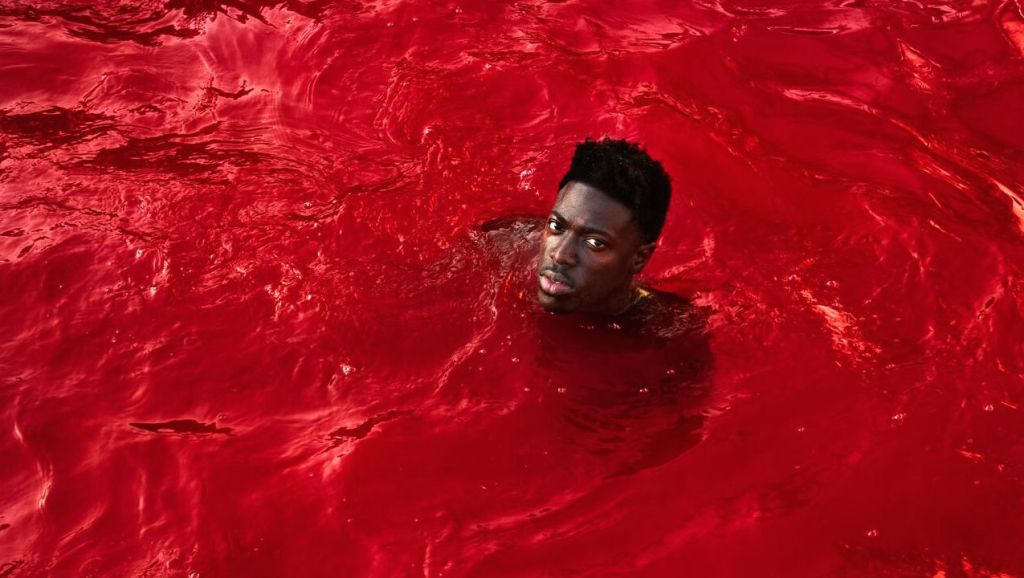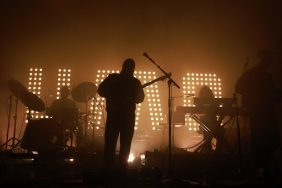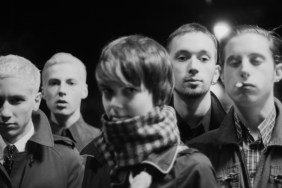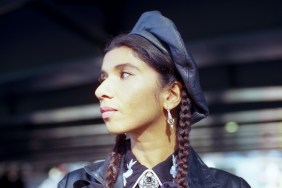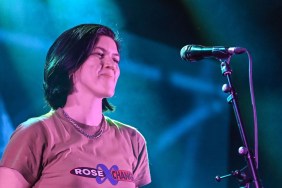Moses Sumney is an artist who thrives on independence. Performing his complex compositions live on his own, with the help of loops and effects, he is not afraid of standing alone on a stage with no one to back him up if he makes a mistake. While you might think this is the manifestation of some kind of musical death wish, the truth is he just likes the thrill of playing on the edge between harmony and chaos.
It’s the danger of things collapsing into the latter that keeps performing live interesting for Sumney. While most artists attempting to recreate the kind of ambitious recordings that he has become known for would choose the safe path and crack out the laptop and MIDI controller, Sumney says no. Preferring to keep things real, Sumney wants audiences to engage with his music and what he is doing on stage rather than just spectate.
With his Lamentations EP having set critics raving earlier this year, we caught up with the charming and witty singer-songwriter while he was in London putting some finishing touches on his forthcoming album. Tinkering away ahead of his shows in Australia in January – as part of Sugar Mountain Festival, MONA FOMA 2017, and Sydney Festival 2017, the latter of which will see him performing a sell out show in St. Stephens Uniting Church – he was candid about his process and energised about his visit down under.
Music Feeds: So you’ve self-released your EP and when you come out here for Sydney Festival in January you’ll be performing solo on stage. Is self-reliance something that is important to you?
Moses Sumney: Independence was something I wanted to communicate, or maybe solitude.
MF: So you like doing your own thing?
MS: Solo has been my way for a bit of time. I like being able to do what I want to do whenever I want to do it and not having anyone hold me back, or not having to go through a chain of command. Also when something goes wrong I can only blame myself instead of having to blame other people, which is nice. Although sometimes it’s nice to work with other people or play with other people live, they’re both great for very different reasons.
MF: Yeah sure, collaboration on other projects can be a lot of fun. But, I imagine that for you with your own art and your own expression you don’t want to be accountable to anyone else.
MS: I don’t, no. But it was really nice with this EP to work with other people. It was actually the first time I’ve ever worked really intensely with other people on the musical ideas. So that was nice after laying the groundwork and getting to know the stuff myself and getting to know myself musically to sort of subtly open things up to other people.
MF: Was that a learning process for you or was it more a case of refining what you already knew?
MS: I think it was more refining what I already knew but didn’t know that I already knew. It’s like skills you pick up along the way that you don’t execute in an explicit manner, so you don’t know you can do it or how you do it until you just have to do it. But it was really great working with people on their projects as well, I learned a lot about collaboration from that.
MF: Performing as you do, solo on stage with loops filling out the sound etc, how far away from devolving into chaos is the live show at any one time?
MS: It’s very close to crashing and burning at any minute. That’s the only reason I do it really, that’s what makes it exciting. It’s just fun. Now I’ve got it down so tight though that it’s really easy but every once in a while I’ll improvise something or I’ll throw in a twist to keep it interesting to keep me on my toes. It needs to be just as engaging to me as it is to the audience.
MF: I totally agree, I want to see an artist trying new things and actually enjoying themselves on stage. If I want the standard performance I can watch it on YouTube.
MS: That’s what I’m into. Making sure that something is different every time and every show is unique and its own experience.
MF: When you were younger your parents moved to Ghana from California while you were still in school, how did that affect you musically?
MS: It traumatised me. Oh you said musically, ooops. It didn’t affect me explicitly really, although indirectly it definitely had an impact. But my parents didn’t really expose me to local music too much, they just weren’t really music heads. But I think there is a huge wellspring of really dynamic beautiful and intriguing Ghanian music, particularly stuff that is a bit older but I never heard it and because I was so Americanised I didn’t really seek it out myself. In that way I wasn’t incredibly influenced by it, the music I was buying and listening to and referencing when I first started writing as a preteen was Western and American music.
However, there is a lot of percussion that is super present in Ghanian culture and I think that probably had an impact on how I hear rhythm and how I incorporate rhythm in my music. Although I rarely incorporate rhythm into my music.
MF: Do you think that having that distance from American music in any way affected how it influenced you, or influenced you differently than it would have had you been living in the US?
MS: I think it gave me a desire to make it even more, and it made me a stronger mimic of some things because I was more desperate to be it. Having distance from it allowed me to kind of isolate myself and listen to it even more. Though what I do now is a mix of so many different things, that I don’t know how much it matters.
MF: Well you’ve been compared to everyone from Bon Iver to Billie Holiday. But to me, your music sounds less like someone trying to emulate those influences as someone reacting to them with their own perspective.
MS: I would say that I am invested pretty heavily in what’s next and how sound and genre can be pushed forward. I am not interested in being a revivalist or regurgitating things that already exist. For me, it’s about using pre-existing elements and influences and putting them in a blender to create something that doesn’t exist yet.
MF: So you released Lamentations earlier this year, is there a plan for an album in the works? Will we see it out before you land here in Australia?
MS: I’m definitely not putting an album out before I come to Australia. That’s in January and I am too selfish to share it before then. But I think I am nearing the end of my album process. I’m in London now just working on production and adding a few things to it. But there might be something out before January actually, you’ll just have to wait and see. If it’s not mine, it will be something I’ve done with someone else that will have me all over it.
MF: Speaking of the album, can you tell us more about that? Is it an extension of what we’ve already heard or a massive departure?
MS: It’s pretty different from everything I’ve ever done, which is really typical of me. I am really glad that I put out Lamentations because that is a collection of five songs that don’t always sound like each other and that kind of travel across a lot of different genres. And the album does that too, but maybe at an even more extreme rate. So Lamentations feels like it was preparing people for the album as something that’s not predictable.
MF: Eclecticism seems to be pretty central to what you do.
MS: It’s more like I can’t help it. I try to be normal but I just can’t, I just can’t go with one sound as much as I try.
MF: Musical schizophrenia then.
MS: And actual schizophrenia.
MF: Well I’m sure it’ll make for an entertaining and dynamic live show. Speaking of the live show, you’ll be performing in St Stephen’s Uniting Church for Sydney Festival, are you excited?
MS: I am, I love performing in churches. I just did a whole church tour actually!
MF: Really? Just churches?
MS: Well it was a more of a mini tour, just L.A. and London, so I guess Sydney will be an extension of that. But what I really love about playing in churches is that people don’t talk, and they’re too afraid to speak. I love fear, so I’m playing a church in Sydney. There is nothing like a bloody Jesus hanging above the artist to make you feel moved.
MF: Considering how important your vocals are to the sound and all the reverb you use, does the space you perform in have a big impact on the performance itself?
MS: Oh yeah, entirely. I think my music is very intimate and I think there is a sanctity to some spaces that require intimacy at least in the way that you engage with the music. So I want to perform in venues that feel sacred for that reason.
MF: Your music does sort of demand that people engage with it closely rather than say a dance music act or heavy metal band.
MS: I prefer that, I prefer people to engage with music as if they are engaging with a piece of art in a museum, as opposed to just entertainment.
–
Moses Sumney will be performing as part of Sydney Festival 2017, MONA FOMA 2017, and Sugar Mountain Festival.
Sydney Festival 2017
Saturday, 14th January
St Stephen’s Uniting Church
Tickets: Sydney Festival
Sunday, 15th January
Magic Mirrors Spiegeltent, Meriton Festival Village
Tickets: Sydney Festival
Wednesday, 18th January
The Toff, Melbourne
Tickets: Moshtix
MOFO 2017
Wednesday, 18th January – Sunday, 22nd January
Museum of Old and New Art, Hobart
Tickets: MOFO
Sugar Mountain 2017
Saturday, 21st January 2017
Victorian College of the Arts, Melbourne
Tickets: Sugar Mountain
